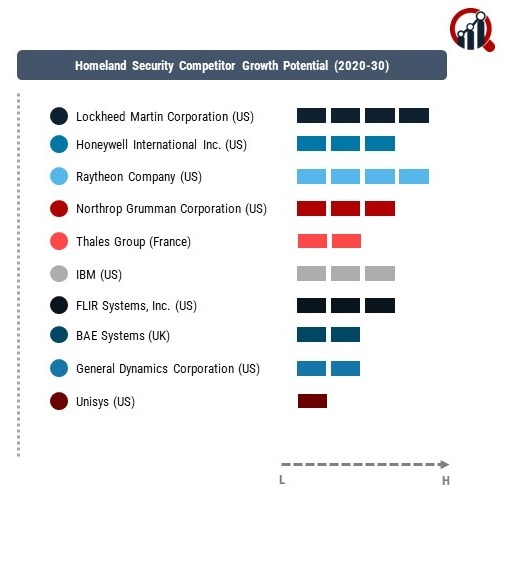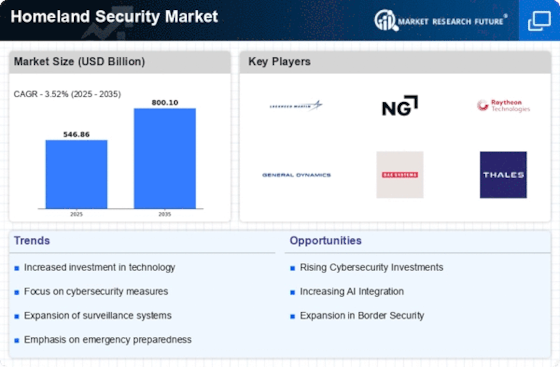Top Industry Leaders in the Homeland Security Market

Homeland Security Market Outlook
Key players in the Homeland Security Market employ various strategies to maintain their competitive edge and capitalize on market opportunities. These strategies include:
Technological Innovation: Companies invest heavily in research and development to develop advanced security technologies and solutions, such as cybersecurity systems, surveillance and reconnaissance systems, biometric identification systems, and border security solutions, to enhance threat detection, prevention, and response capabilities.
Strategic Partnerships and Collaborations: Collaborations with government agencies, international organizations, technology partners, and industry stakeholders help companies access new markets, expand their product portfolio, and stay abreast of emerging threats and technologies.
Focus on Integration and Interoperability: Companies offer integrated and interoperable security solutions that combine multiple technologies and systems into a cohesive framework, enabling seamless information sharing, situational awareness, and coordinated response across different agencies and jurisdictions.
Global Expansion: Key players focus on expanding their geographical footprint by establishing subsidiaries, joint ventures, and partnerships in strategic locations to better serve their customers and capitalize on regional opportunities.
Strategies Adopted By Key Players Homeland Security Market
Lockheed Martin Corporation (US),
Honeywell International Inc. (US),
Raytheon Company (US),
Northrop Grumman Corporation (US),
Thales Group (France),
IBM (US),
FLIR Systems, Inc. (US),
BAE Systems (UK),
General Dynamics Corporation (US),
Unisys (US),
Elbit Systems Ltd. (Israel),
Harris Corporation (US),
CACI International Inc (US),
Boeing (US), and
Leidos (US).
Factors for Market Share Analysis: Several factors contribute to the analysis of market share in the Homeland Security Market, including:
Breadth and Depth of Product Portfolio: The breadth and depth of security solutions and services offered by companies play a critical role in determining market share, with companies offering comprehensive and scalable solutions gaining a competitive advantage.
Reputation and Track Record: The reputation, track record, and experience of companies in delivering reliable, high-quality security solutions and services to government and commercial customers influence market share, with companies with a proven track record of success gaining trust and confidence.
Customer Relationships and Contracts: Strong relationships with government agencies, law enforcement organizations, and critical infrastructure operators enhance market share by fostering long-term partnerships, repeat business, and referrals, with companies securing lucrative contracts and tenders gaining market share.
Regulatory Compliance and Certification: Compliance with regulatory requirements, standards, and certifications, such as DHS SAFETY Act certification, ISO 27001 certification for cybersecurity solutions, and FIPS 140-2 certification for encryption solutions, is essential for gaining market share and winning government contracts.
New and Emerging Companies: In addition to established players, new and emerging companies are entering the Homeland Security Market, bringing innovative technologies and solutions. These companies often focus on niche segments or disruptive technologies, challenging traditional players and driving innovation in the industry. Some notable new and emerging companies in the market include:
Palantir Technologies Inc.
Anduril Industries
Claroty Inc.
Dragos Inc.
Patriot One Technologies Inc.
Telos Corporation
Industry News and Current Company Investment Trends: Recent developments and investment trends in the Homeland Security Market reflect a growing focus on cybersecurity, critical infrastructure protection, and intelligence-driven security solutions. Key highlights include:
Rise of Cybersecurity Threats: Companies are investing in advanced cybersecurity solutions, such as threat intelligence platforms, endpoint detection and response (EDR) systems, and security analytics tools, to defend against sophisticated cyber threats targeting government networks, critical infrastructure, and supply chains.
Emphasis on Critical Infrastructure Protection: Companies are focusing on critical infrastructure protection solutions, such as perimeter security systems, access control systems, and intrusion detection systems, to safeguard key assets and facilities from physical and cyber threats, including terrorism, sabotage, and natural disasters.
Adoption of AI and Machine Learning: Companies are leveraging artificial intelligence (AI) and machine learning (ML) algorithms to analyze vast amounts of data, identify patterns, detect anomalies, and automate decision-making processes, enhancing security operations, threat detection, and incident response capabilities.
Investment in Emerging Technologies: Companies are investing in emerging technologies, such as quantum-resistant cryptography, blockchain for supply chain security, and autonomous drones for border surveillance, to address evolving threats and challenges in the homeland security landscape.
Overall Competitive Scenario: The Homeland Security Market is highly competitive, characterized by technological innovation, strategic partnerships, and regulatory compliance. Established players leverage their experience, expertise, and global presence to maintain market leadership, while new entrants disrupt the market with innovative solutions and agile strategies. As the industry continues to evolve, companies that focus on technological differentiation, customer-centricity, and collaboration will thrive in the competitive landscape of the Homeland Security Market.











